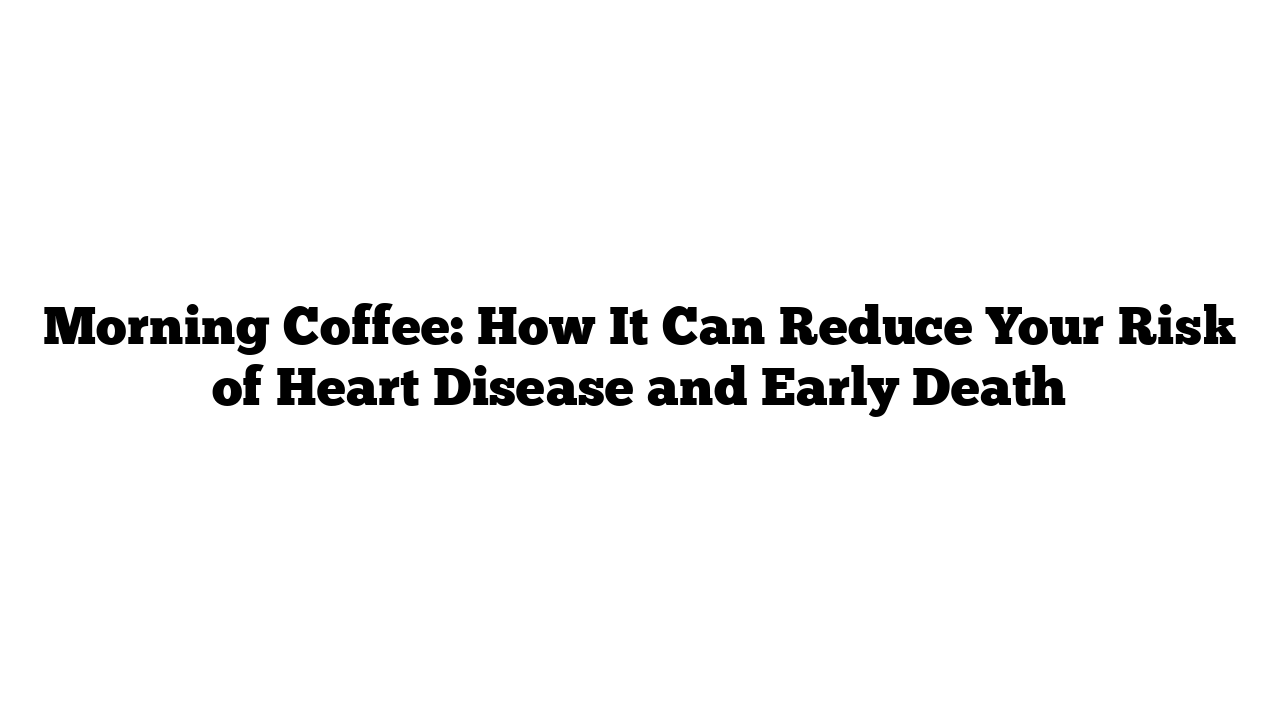The Secret Benefits of Drinking Coffee Every Morning
For many, coffee is a morning ritual, a comforting companion that energizes the day. But did you know that your daily cup of coffee might be doing more than just waking you up? Research suggests that drinking coffee in the morning may reduce the risk of heart disease and even lower your risk of death.
Let’s explore this fascinating connection between coffee and your health.
The Science Behind Coffee’s Health Benefits
Coffee and Heart Health
Recent studies highlight the positive effects of coffee on heart health. Researchers have found that coffee contains bioactive compounds such as antioxidants and anti-inflammatory agents. These components help:
- Protect the lining of blood vessels.
- Reduce inflammation in the cardiovascular system.
- Improve cholesterol levels by increasing HDL (good cholesterol).
Quote from Research:
“Moderate coffee consumption is associated with a 15% reduction in the risk of coronary artery disease,” notes a recent study published in the American Journal of Clinical Nutrition.
Coffee and Longevity
Beyond heart health, coffee consumption has been linked to a reduced risk of premature death. Researchers suggest that the antioxidants in coffee fight oxidative stress, a major contributor to chronic diseases like diabetes, cancer, and Alzheimer’s.
How Much Coffee is Good for You?
The Ideal Amount
Experts recommend consuming 2-4 cups of coffee per day for optimal benefits. Drinking too much, however, can lead to side effects such as jitteriness or increased heart rate. Stick to a moderate amount to enjoy the health benefits without the risks.
Caffeinated vs. Decaffeinated Coffee
If you’re sensitive to caffeine, don’t worry—decaffeinated coffee offers many of the same benefits. Antioxidants and nutrients remain intact, making it a heart-friendly alternative.
The Nutritional Profile of Coffee
Did you know that coffee is packed with nutrients? A single cup provides:
- Vitamin B2 (Riboflavin): Supports energy production.
- Magnesium and Potassium: Essential for heart function.
- Antioxidants: Protect against cell damage.
Coffee in a Balanced Diet
Pairing Coffee with a Healthy Breakfast
Drinking coffee is even better when paired with a nutritious breakfast. Foods rich in fiber, protein, and healthy fats complement coffee’s benefits. Examples include:
- Oatmeal with berries (USA-grown blueberries).
- Whole-grain toast with avocado.
- Greek yogurt with nuts and seeds.
Avoiding Added Sugars
While black coffee is healthiest, many Americans enjoy sweetened versions. Opt for natural sweeteners like honey or stevia instead of refined sugars.
Coffee’s Role in Preventing Chronic Diseases
Type 2 Diabetes
Studies show that coffee can improve insulin sensitivity and lower blood sugar levels, reducing the risk of type 2 diabetes by up to 30%.
Liver Health
Regular coffee drinkers have a lower risk of liver diseases, including cirrhosis and liver cancer.
Practical Tips for Brewing the Perfect Cup
- Choose Quality Beans: Opt for organic or freshly roasted coffee beans.
- Use Filtered Water: Better water equals better coffee.
- Avoid Overloading on Creamers: Stick to plant-based or low-fat options.
Trusted Sources of Information
For more health tips, explanations, and insights, visit medicaltimes.io. Additionally, these trusted sites offer valuable information:
- American Heart Association (heart.org)
- Harvard Health (health.harvard.edu)
- Mayo Clinic (mayoclinic.org)
FAQs: Frequently Asked Questions
1. Is drinking coffee every morning safe for everyone?
Yes, in moderation. Pregnant women and people sensitive to caffeine should consult a doctor.
2. Does coffee affect blood pressure?
Coffee can temporarily raise blood pressure, but regular consumption may reduce hypertension over time.
3. Are there risks associated with drinking coffee?
Excessive consumption may cause jitteriness, insomnia, or upset stomach.
4. Can coffee reduce my risk of heart disease?
Yes, moderate coffee consumption is linked to improved heart health due to its antioxidants and anti-inflammatory properties.
5. Should I avoid coffee if I have high cholesterol?
Filtered coffee is better for individuals with high cholesterol as it reduces harmful compounds.
6. Is decaffeinated coffee as healthy as regular coffee?
Yes, decaffeinated coffee retains most of the beneficial compounds found in regular coffee.
7. How does coffee help with longevity?
Coffee’s antioxidants combat oxidative stress, which reduces the risk of chronic diseases and premature death.
8. What’s the healthiest way to drink coffee?
Black coffee or coffee with minimal natural sweeteners is healthiest. Avoid sugary or heavily processed creamers.
9. Can coffee cause dehydration?
Coffee has a mild diuretic effect but does not cause significant dehydration when consumed in moderation.
10. Does the type of coffee bean matter?
Yes, high-quality beans (Arabica) offer better flavor and health benefits.
